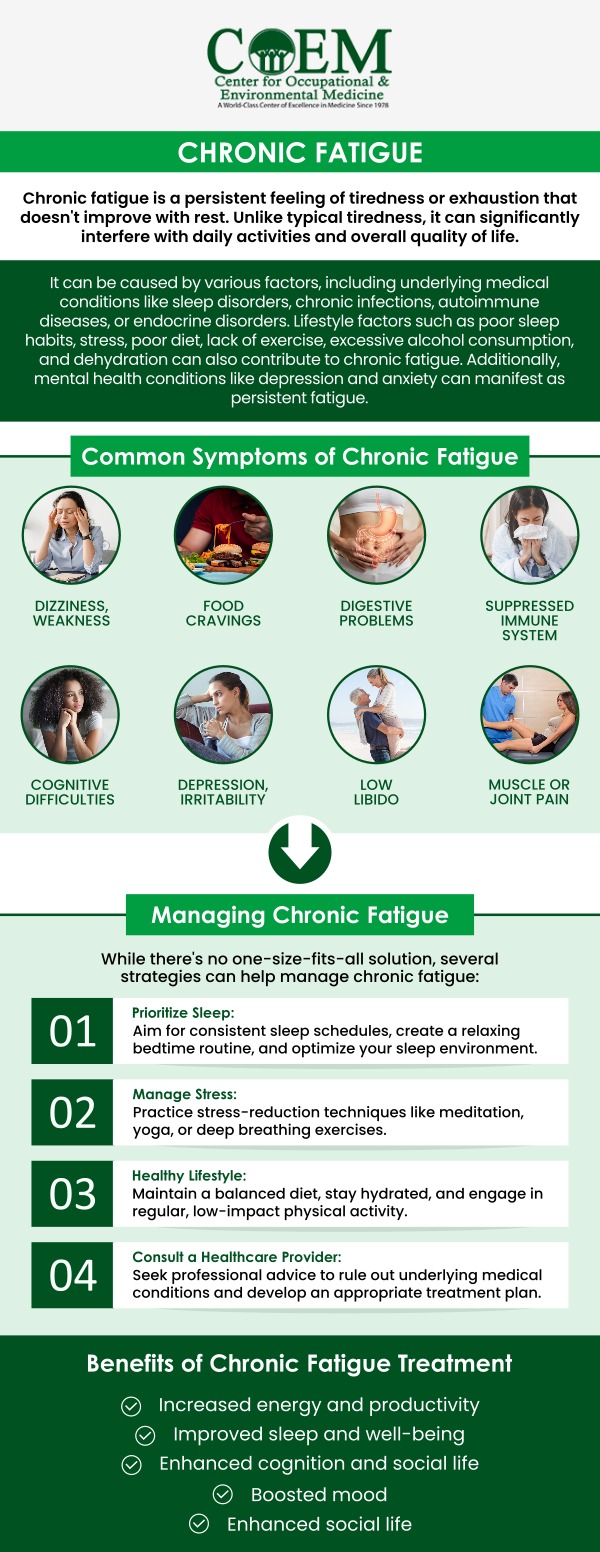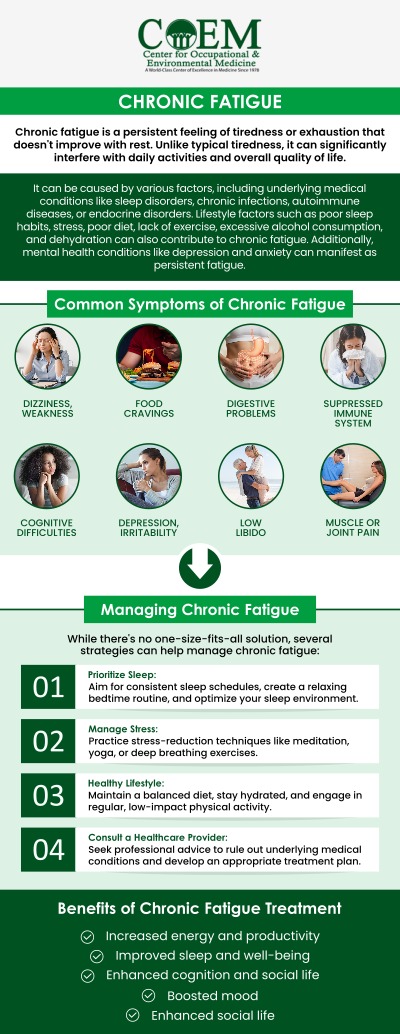Epstein-Barr Virus and Chronic Fatigue Treatment in Charleston, SC
Epstein-Barr Virus (EBV) has been linked to persistent fatigue, weakened immunity, and chronic inflammation in some individuals. At The Center for Occupational and Environmental Medicine (COEM) in Charleston, SC, our medical team focuses on identifying underlying immune and metabolic imbalances contributing to ongoing fatigue. Through comprehensive evaluation and personalized care, COEM helps patients strengthen immune resilience, reduce inflammation, and restore energy for long-term wellness. For more information, contact us today or schedule an appointment online. We are conveniently located at 7510 North Forest Drive North Charleston, SC 29420. Patients routinely fly in to be evaluated by COEM, as we serve patients internationally. Find out if you have been exposed, extensive lab testing is available.


Table of Contents:
What is Epstein-Barr Virus (EBV)?
How is Epstein-Barr Virus related to chronic fatigue?
What are the symptoms of Epstein-Barr Virus infection?
Can EBV cause chronic fatigue syndrome (CFS)?
Exploring Treatment Solutions for Chronic Fatigue from Epstein-Barr Virus with Dr. Stephen P. Elliott, MD
Epstein-Barr Virus (EBV) is a member of the herpesvirus family and is one of the most widespread human viruses worldwide. It is primarily transmitted through saliva. Many individuals become infected with EBV during childhood or adolescence, often without noticeable symptoms. Once the virus enters the body, it remains dormant within the immune system and can reactivate under certain conditions, such as stress, illness, or immune suppression. EBV is the cause of infectious mononucleosis, an illness that often presents with fatigue, sore throat, swollen glands, and fever.
In addition to acute infection, EBV has been linked to a range of health concerns due to its ability to influence immune function and inflammation. After the initial infection subsides, the virus can persist within the body, occasionally reactivating and triggering ongoing symptoms. This lingering presence can make it difficult to distinguish between recovery and recurrence, particularly when fatigue or immune disturbances continue. In functional and environmental medicine, identifying an active or reactivated EBV infection is an important step toward understanding unexplained fatigue and related health conditions.
Through specialized testing, practitioners can measure viral antibodies and determine whether EBV is currently active or contributing to chronic symptoms. In some cases, supportive therapies such as High-Dose Vitamin C IV Therapy are used to enhance immune function, reduce oxidative stress, and support the body’s ability to fight viral reactivation. Addressing viral load and immune imbalance can be an essential step toward restoring long-term health and energy.
EBV and chronic fatigue relate in how the virus interacts with the immune and nervous systems. When EBV reactivates, it can place stress on the immune response, leading to inflammation and cellular dysfunction that affect energy production. This immune activation can persist even after the infection is considered dormant, leaving individuals with lasting fatigue, body aches, and cognitive sluggishness. Over time, the body’s resources become depleted, making recovery more difficult and fatigue more pronounced. Many individuals with chronic fatigue experience symptoms similar to those seen during an EBV flare-up, including muscle weakness, swollen lymph nodes, and poor concentration. Laboratory testing can help determine whether EBV antibodies are elevated or if viral activity remains present in the system. Identifying this connection allows clinicians to tailor care toward supporting immune balance and restoring normal energy function.
At The Center for Occupational and Environmental Medicine (COEM), treatment approaches for EBV-related fatigue may include High-Dose Vitamin C IV Therapy to help strengthen immune defense and counteract inflammation associated with viral activity. By viewing the condition alongside potential viral activity, immune dysfunction, and toxin exposure, specialists at COEM can develop individualized treatment plans that address the underlying causes rather than temporary relief. Supporting the immune system and reducing viral triggers are essential steps in helping patients recover from long-term fatigue related to EBV.
Early signs of EBV may include fatigue, fever, sore throat, and swollen lymph nodes in the neck. Some individuals may also experience headaches, muscle aches, or general fatigue that lasts several weeks. In adolescents and adults, EBV is a leading cause of infectious mononucleosis, which is often marked by prolonged exhaustion and difficulty resuming normal daily activities. In some cases, symptoms persist after the initial infection has cleared. Individuals may continue to feel weak, struggle with sleep disturbances, or experience intermittent low-grade fevers and swollen glands. Chronic or recurrent symptoms following EBV infection may be tied to deeper imbalances in immune and metabolic function. Identifying these patterns through targeted lab testing helps determine whether the virus remains active or is contributing indirectly to fatigue, mood changes, or brain fog. Restoring immune health and addressing potential reactivation can help reduce symptoms and promote more consistent energy over time.
EBV has been linked to a potential role in chronic fatigue syndrome (CFS). While EBV is not the sole cause, it is considered a significant contributing factor for many patients. The virus can alter immune and neurological function, leading to ongoing inflammation and impaired energy metabolism. These changes can result in the prolonged exhaustion, cognitive difficulties, and muscle pain that define chronic fatigue syndrome. Individuals with a history of EBV infection may have elevated antibodies or signs of viral reactivation long after the initial illness. This suggests that the immune system continues to recognize and respond to the virus, even in its latent state. Such immune persistence can create a cycle of fatigue and inflammation that prevents full recovery. At COEM, providers use functional lab testing to evaluate whether EBV may be influencing symptoms of chronic fatigue. When viral reactivation is detected, treatment plans focus on strengthening immune resilience, improving mitochondrial function, and reducing factors that trigger viral activity. Addressing these underlying mechanisms helps patients achieve lasting improvement alongside symptom relief.
Board-Certified Dr. Stephen P. Elliott, MD, D.A.B.F.M., F.A.A.A.M., F.M.A.P.S., integrates advanced functional medicine testing and individualized care to address chronic fatigue linked to EBV. His approach begins with a detailed assessment of the patient’s medical history, lifestyle, and laboratory findings to uncover whether viral reactivation is contributing to persistent exhaustion. By understanding the patient’s unique immune response and identifying potential factors such as toxin exposure or hormonal imbalance, Dr. Elliott develops comprehensive treatment plans that promote long-term recovery. Treatment strategies may include nutritional therapy, targeted supplementation, and immune-supportive interventions to reduce viral activity and enhance resilience. High-Dose Vitamin C IV Therapy is often incorporated as part of this care model, helping to boost antioxidant defenses, reduce oxidative stress, and support the immune system in managing viral load. Restoring mitochondrial function and optimizing cellular energy production are central to his approach, as these processes are often disrupted by chronic infection. Stress management, detoxification support, and anti-inflammatory nutritional plans are also incorporated to create a balanced internal environment where the body can heal. As a MedMAPS-Certified Physician Fellow, Dr. Elliott combines functional and environmental medicine to provide an integrative model of care. He, along with specialists at COEM, focuses on treating the root causes of fatigue to promote long-term improvements. By addressing EBV reactivation and the broader systemic imbalances it creates, patients often experience renewed energy, improved concentration, and a restored sense of well-being.
Epstein-Barr Virus (EBV) treatment is available at The Center for Occupational and Environmental Medicine (COEM). For more information, contact us today or schedule an appointment online. We are conveniently located at 7510 North Forest Drive North Charleston, SC 29420. We serve patients from Charleston SC, Mount Pleasant SC, Summerville SC, North Charleston SC, Goose Creek SC, Ladson SC, Hanahan SC, James Island SC, John’s Island SC, Daniel Island SC, West Ashley SC, Moncks Corner SC, Sullivans Island SC, Folly Beach SC, Isle of Palms SC and all of South Carolina, Nationally, and Internationally. Patients routinely fly into Charleston to be evaluated by COEM and to enjoy this beautiful city, which is a Condé Nast and Travel and Leisure Top Domestic and International Tourist Destination.

Check Out Our 5 Star Reviews


Check Out Our 5 Star Reviews


Additional Services You May Like
- Functional Medicine
- Allergy and Autoimmunity
- Asthma and COPD
- Autoimmune Diseases
- Allergy and Immunology
- Anti Aging Medicine
- Autism and Children
- ADHD
- Bacterial Infections
- Chemical Toxicity
- Candida Fungal Problems
- Cancer Treatment
- Chronic Illness
- Chronic Inflammatory Response Syndrome (CIRS)
- Chronic Fatigue
- Cardiovascular Disease
- Carbon Monoxide Poisoning
- Chelation Therapy
- Depression
- Environmental Medicine
- Ear Ringing and Dizziness
- Fatigue Treatment
- Fertility and Preconception Care
- Gut Health
- Heavy Metal Toxicity
- Hormonal Imbalances
- Headaches and Migraines
- Hormone Balancing (Men & Women)
- Hepatitis
- Integrative Medicine
- Independent Medical Evaluations
- Influenza
- Lab Testing
- Mold Toxicity
- Malnutrition
- Neurodegenerative Disease
- Natural Hormone Balancing For Women
- Preservative-Free IV Therapy
- Stomach Acid Imbalance
- Smoking Cessation Program
- Skin Therapy (Anti-Aging)
- Swine Flu
- Thyroid
- Mold Toxicity
- Vitamin D
- Weight Loss Program
- Women’s Breast Health Formula

Additional Services You May Like
- Functional Medicine
- Allergy and Autoimmunity
- Asthma and COPD
- Autoimmune Diseases
- Allergy and Immunology
- Anti Aging Medicine
- Autism and Children
- ADHD
- Bacterial Infections
- Chemical Toxicity
- Candida Fungal Problems
- Cancer Treatment
- Chronic Illness
- Chronic Fatigue
- Cardiovascular Disease
- Chronic Inflammatory Response Syndrome (CIRS)
- Carbon Monoxide Poisoning
- Chelation Therapy
- Depression
- Environmental Medicine
- Ear Ringing and Dizziness
- Fatigue Treatment
- Fertility and Preconception Care
- Gut Health
- Heavy Metal Toxicity
- Hormonal Imbalances
- Headaches and Migraines
- Hormone Balancing (Men & Women)
- Hepatitis
- Integrative Medicine
- Independent Medical Evaluations
- Influenza
- Lab Testing
- Mold Toxicity
- Malnutrition
- Neurodegenerative Disease
- Natural Hormone Balancing For Women
- Preservative-Free IV Therapy
- Stomach Acid Imbalance
- Smoking Cessation Program
- Skin Therapy (Anti-Aging)
- Swine Flu
- Thyroid
- Mold Toxicity
- Vitamin D
- Weight Loss Program
- Women’s Breast Health Formula










